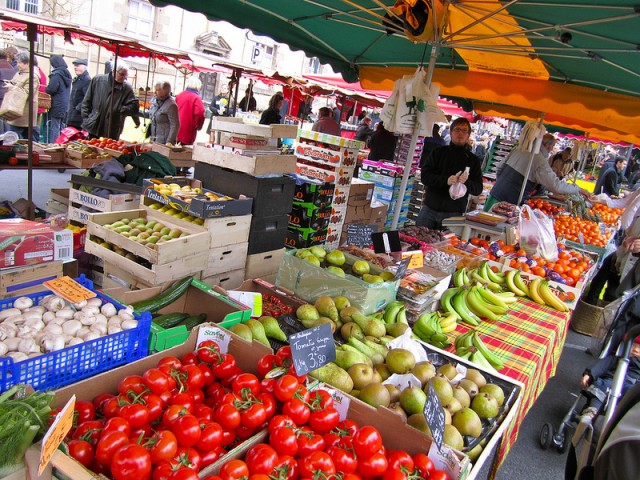French Grammar: Nouns – Definite Articles

Creative Commons Image via The LEAF Project
…
Identify:
French Grammar: Nouns – Definite Articles
la grammaire française: les substantifs – les articles définis
Nouns are people, places, and things. They have names! In French, definite articles (les articles définis) are considered part of the noun. You’ll need to learn to use nouns with their correct articles (les articles) if you want to talk about people, places and things!
Study:
Definite Articles (les articles définis) :
a) The definite article (l’article défini) in English has one form : THE (+ noun) …
There are FOUR different definite articles in French (le / la / l’ / les), split by number and gender.
All four forms of the definite article in French mean “THE” :
Masculine / Singular:
le stylo
l’homme
Feminine / Singular:
la chaise
l’école
Masculine Plural:
les stylos
les hommes
Feminine Plural:
les chaises
les écoles
* Both masculine singular and feminine singular nouns that begin with a vowel or silent ‘h’ take the definite article l’.
Le livre est intéressant.
The book is interesting.
La fille étudie beaucoup.
The girl studies a lot.
L’homme est intelligent.
The man is intelligent.
L’étudiante parle espagnole.
The student (feminine) speaks Spanish.
Les stylos sont sur la table.
The pens are on the table.
Les femmes prennent du café.
The women are drinking coffee.
b) In French, the article is used before each noun, even though it is often omitted in English:
les hommes et les femmes = (the) men and (the) women
c) The DEFINITE ARTICLE in French is used with a specific noun, or a noun that has already been mentioned (for example: le professeur), just as in English (the professor). In general, the DEFINITE ARTICLE is used much more in French than it is in English. The following phrases illustrate how the DEFINITE ARTICLE is used in French, whereas it would normally not be used in a comparable English phrase:
1) With nouns used in a general or abstract sense:
Il aime le fromage.
He likes cheese.
2) With the names of school subjects and languages (but NOT directly after ‘parler’, after ‘en’, or in an adjective phrase with ‘de’):
Nous étudions le français.
We study French.
Le français est facile.
French is easy.
Tu parles bien le français.
You speak French well.
But:
Tu parles français.
You speak French.
Ce livre est en français.
This book is in French.
Voilà mon prof de français.
There’s my French professor.
3) With parts of the body in place of a possessive adjective, when it is clear whose body part is being referred to:
Je me lave le visage.
I wash my face.
4) With days of the week, to indicate that something happens regularly:
Le dimanche, je vais à l’église.
On Sundays, I go to church.
5) With dates:
C’est lundi, le 8 octobre.
It’s Monday, October 8.
6) With the names of most countries (except after the preposition ‘en’):
Ils visitent la France.
They visit France.
But:
Paris est en France.
Paris is in France.
7) With certain common expressions:
à l’école
to (in) school
à la maison
home, at home
le matin
in the morning
l’après-midi
in the afternoon
le soir
in the evening
la nuit
at night
le week-end
on the week-end
la semaine prochaine
next week
le mois dernier
last month
l’année passée
last year
l’hiver prochain
next winter
Adapt:
Tu as le livre pour la classe de français?
Do you (informal) have the book for the French class?
Non, je n’ai pas le livre pour la classe de français.
No, I do not have the book for the French class.
Est-ce que l’étudiant sait parler français?
Does the student know how to speak French?
Non, l’étudiant ne sait pas parler français.
No, the student does not know how to speak French.
Est-ce que vous avez les devoirs?
Do you (formal) have the homework?
Oui, j’ai les devoirs.
Yes, I have the homework.
Tu vas à la bibliothèque le soir?
Do you go to the library in the evening?
Non, je ne vais pas à la bibliothèque le soir.
No, I do not go to the library in the evening.
Explore:
 The LEAF Project
The LEAF Project
www.leaflanguages.org
Creative Commons Attribution-ShareAlike 3.0
